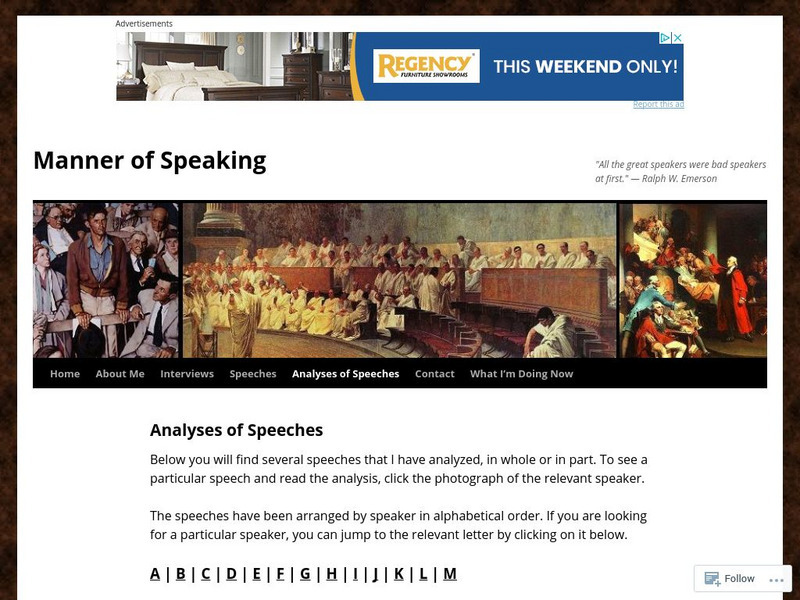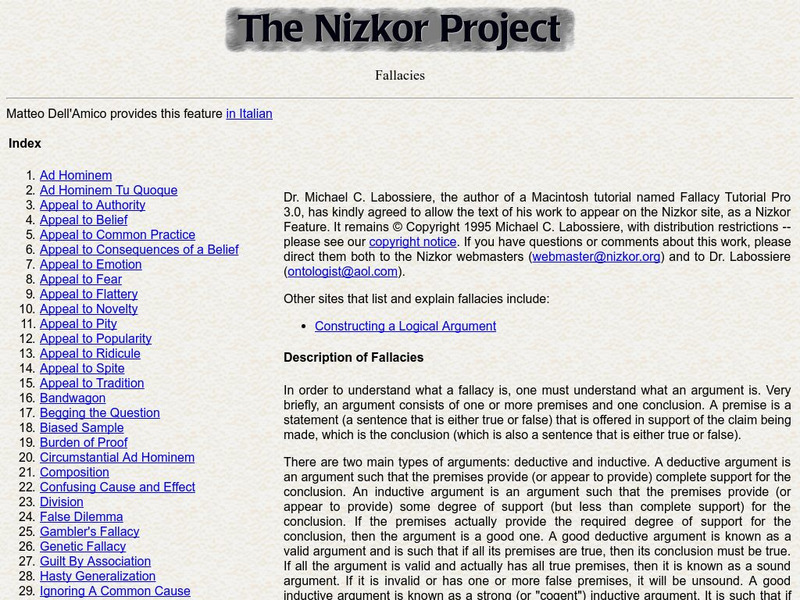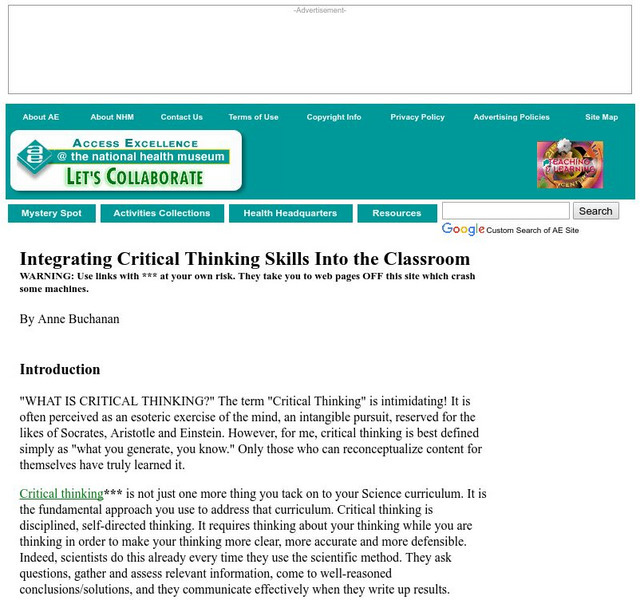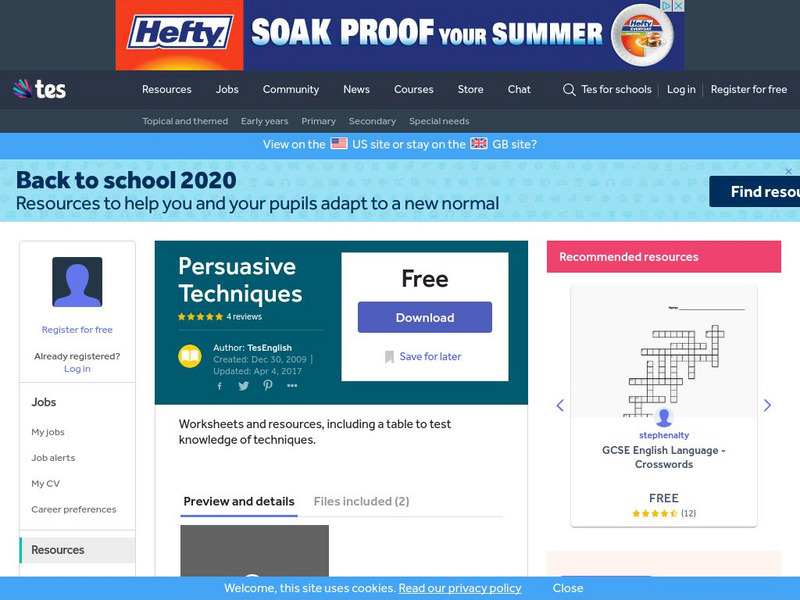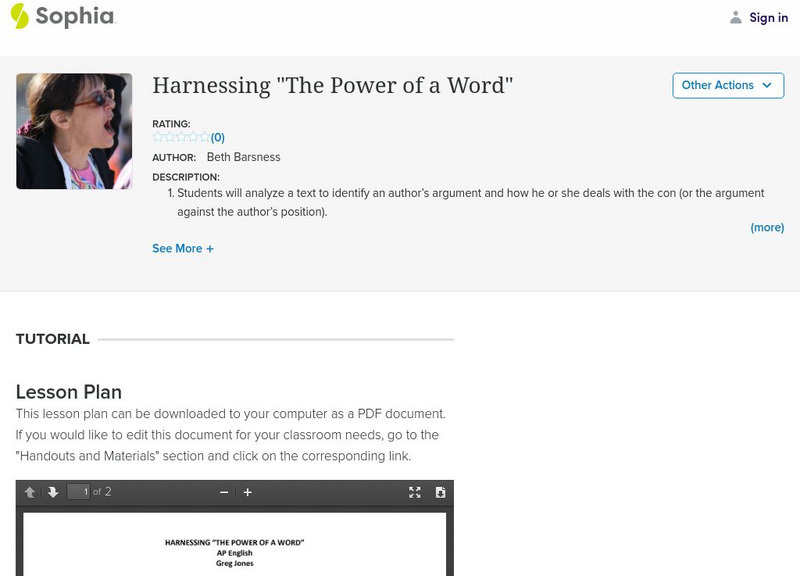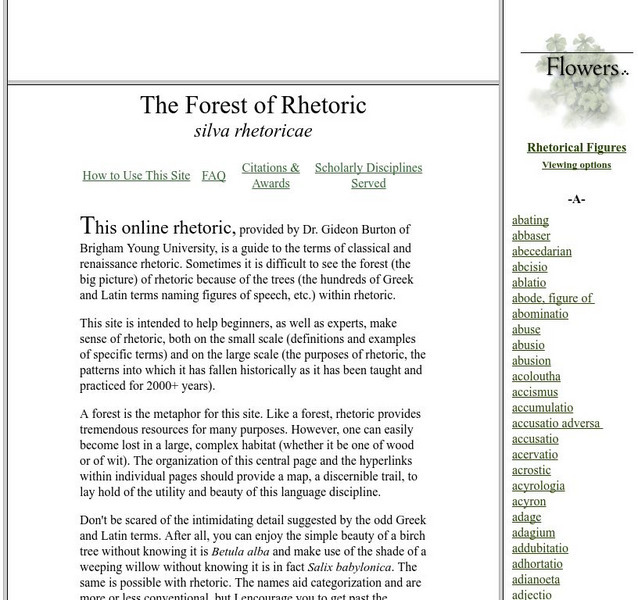Other
The Skeptic's Dictionary: Begging the Question
This site from The Skeptic's Dictionary defines the term and provides a number of examples. Each example is given a complete explanation.
Other
Wsu: Improving Your Argument
Students writing persuasive essays run the risk of using inaccurate or illogical reasoning. This site by Weber State University provides pointers to help eliminate this problem. Several dos's and don'ts are given, as are 14 common...
Other
Fallacy Files: Loaded Question
Good explanation of the logical fallacy known as the loaded question (also known as complex question, many questions, or plurium interrogationum). An example, explanation of the example, and links to additional resources are all provided...
Other
Speaking Effectively: Supporting the Talk
This substantial section focuses on supporting the main points of your speech or presentation. Find out how to avoid faulty reasoning and irrational appeals.
Other
Manner of Speaking: Analyses of Speeches
This is a collection of videos of speeches by well-known personalities and celebrities. Each one is accompanied by an analysis of the speech's structure, devices, and arguments. Some videos are excerpts from movies, some are from...
Other
The Nizkor Project: Fallacies
The Nizkor Project: Fallacies is a text provides an explaination of fallaces. It identifies the specific kinds of fallacies as well as gives a couple of examples.
ReadWriteThink
Read Write Think: Persuasion Rubric
A printable four-point rubric to use when assessing a persuasive piece with a focus on organization, a goal or thesis, reasons/support, audience, word choice, visuals/delivery, and grammar/usage/mechanics. Directions on how to use this...
Brown University
Brown University: Critical Writing and Thinking
Resource explains exactly what critial writing and thinking are, questions to help you think critically, paper writing tips, troubleshooting, and more.
National Health Museum
Access Excellence: Integrating Critical Thinking Skills
This site from Access Excellence explores how, as an educator, you can incorporate critical thinking skills into the classroom. Content focuses on how to cover content so that students can grasp information, engage with the teacher, read...
Austin Independent School District
Austin Independent School District: Logical Fallacies [Pdf]
A slide show explaining different types of fallacies in persuasive texts including personal attack, bandwagon, appeal to authority, and many more. Then try to find the fallacy in several examples; answers and explanations provided.
iCivics
I Civics: Games: Argument Wars
Games in which players act as lawyers arguing head to head before a judge about real Supreme Court cases.
Grammarly
Grammarly Handbook: Methods of Reasoning
A list (with examples) of common errors in logic including the following: non sequiturs, hasty generalization circular argument, ad hominem, ad populum, and red herring.
Johns Hopkins University
Johns Hopkins University Sheridan Libraries: Information and Its Counterfeits
Distinguishing information from propaganda, biased reporting and misinformation is an important skill. This short article defines each of these, and provides examples of each.
Other
Flickr: Critical Thinking Skills Poster
A downloadable critical thinking skills poster based on the original six levels of Bloom's taxonomy.
Other
Six Minutes: Speech Analysis #1: How to Study and Critique a Speech
Dlugen presents a detailed collection of tips to observe when critiquing others' speeches. This skill is critical in improving individual presentation abilities. SL.9-10.3 Eval Presentation. CCSS.ELA-Literacy.CCRA.SL.3, SL.9-10.3 Eval...
TES Global
Tes: Persuasive Techniques
[Free Registration/Login Required] A graphic organizer is provided to help students analyze persuasuve techniques in an advertisement. Students will analyze an advertisement and apply their understanding of the content.
Sophia Learning
Sophia: Harnessing "The Power of a Word"
In this PDF lesson plan, students will analyze the text "The Power of a Word" by Leonard Pitts, Jr. to identify an author's argument and how he deals with the counterargument. Students will extend the argument by agreeing or disagreeing...
Other
Critical Thinking: Basic Questions & Answers
An interesting interview with Richard Paul discussing what critical thinking means. There are many insights as to what critical thinking involves and how it should be used in the classroom.
Other
Becoming a Critic of Your Thinking
This resource presents an article that explains why it is important to be someone who is a good thinker. Provided are four strategies for critical thinking.
Georgia Department of Education
Ga Virtual Learning: Informative Speech Critique Sheet (Pdf)
This PDF is a critique form for evaluating informative speeches. SL.9-10.3 Eval Presentation. CCSS.ELA-LiteracySL.3, SL.9-10.3 Eval Presentation
Other
How to Analyze a Speech
An interesting approach to how to analyze a speech. Presents a rhetorical pentangle as well as a rhetorical triangle, where each of the vertices represents an item to analyze. There is also an outline of the different areas to examine in...
Brown University
Brown University: Debates
Use this resource to learn how to engage in collaborative discourse and argumentation enhances student's conceptual understandings and refines their reasoning abilities. Be sure to click on the links to other resources.
University of North Carolina
University of North Carolina: The Writing Center: Fallacies
Discussion of common fallacies, along with definitions, examples, and tips on avoiding them.
Brigham Young University
Brigham Young University: Forest of Rhetoric
This site is provided for by the Brigham Young University. Almost anything you would want to know about rhetoric and speech is here with great examples and explanations. Intended for a college-level audience, but plenty for younger...




